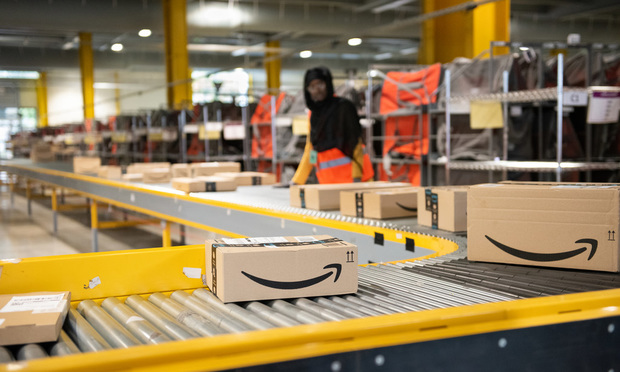Should Amazon Pay Workers Waiting for Security Screenings? 6th Circuit Asks SCOPA to Decide
The federal appeals court on Monday certified two questions of first impression to the Pennsylvania Supreme Court, stemming from a class action lawsuit claiming that practices at Amazon's warehouse outside Allentown, Pennsylvania, violate the Keystone State's minimum wage laws.
November 05, 2019 at 02:47 PM
4 minute read
 Photo: Shutterstock
Photo: Shutterstock
Metal detectors and bag searches are increasingly a part of everyday life. But should employers have to compensate their workers as they wait to go through security?
That's at the heart of a question the U.S. Court of Appeals for the Sixth Circuit has asked the Pennsylvania Supreme Court to consider in the case In re Amazon.com. The federal appeals court Monday certified two questions of first impression to the Pennsylvania Supreme Court, stemming from a class action lawsuit claiming that practices at Amazon's warehouse outside Allentown, Pennsylvania, violate the Keystone State's minimum wage laws.
Specifically, the three-judge Sixth Circuit panel asked the justices to consider whether "time spent on an employer's premises waiting to undergo and undergoing mandatory security screenings [is] compensable as 'hours worked' within the meaning of the Pennsylvania Minimum Wage Act," and whether defendants' claim that the waits are "de minimis" can bar the action.
According to Duane Morris appellate attorney Robert Byer, who is not involved in the case, it is now up to the Supreme Court to either accept or reject the case.
"They have done this with some degree of frequency. They have also declined to hear cases," Byer said.
The procedure for certifying questions to the Pennsylvania Supreme Court is relatively recent, Byer said, and is done because federal courts are bound to apply state law.
"What the court of appeals would do is guess. Sometimes it makes more sense to simply send that to the Pennsylvania Supreme Court in cases where there is no precedent," Byer said.
Whether or not the Supreme Court will take up the case is discretionary, but if it does, the court will become the fifth venue in which the case has been handled.
According to the Sixth Circuit panel's 10-page order, written by Judge Richard Griffin, plaintiff Neal Heimbach was a worker at Amazon's warehouse in Breinigsville, Pennsylvania, in the Lehigh Valley region of the state, where employees had to undergo anti-theft security screenings, including metal detectors and bag searches, after they clocked out.
Heimbach filed a proposed class action in the Philadelphia Court of Common Pleas, raising a single count under the PMWA. Defendants removed the case to the Eastern District of Pennsylvania, and then the Judicial Panel on Multidistrict Litigation transferred the case to the Western District of Kentucky, which is where several cases raising state wage-and-hour claims are pending.
After discovery, Heimbach filed for class certification and the defendants filed for summary judgment. The district court tossed the case, finding that Pennsylvania would follow the U.S. Supreme Court's interpretation of the Portal-to-Portal Act amendments to the Fair Labor Standards Act.
Heimbach appealed and asked the intermediate appellate court to certify the question to the Pennsylvania Supreme Court.
Griffin said the case raised an important issue of first impression. Although Amazon had contended that the issue was of little public importance because "almost no" employers in Pennsylvania require their employees to go through "airport-style, anti-theft screening" at the end of each shift, Griffin said the question more broadly deals with whether the Portal-to-Portal Act applies to the PMWA.
"This question touches many more Pennsylvania workers and employers, as evidenced by the cases discussed below grappling with it," Griffin said, before noting how several lower courts in Pennsylvania have handled the issue.
Winebrake & Santillo attorney Peter Winebrake, who is representing Heimbach, said that, since most of the FLSA is regulatory rather than legislative, enforcement has swung wildly under the latest administration, so companies and workers are increasingly relying on state labor laws.
"It's a really important case, and it's going to give the state Supreme Court another opportunity to define the parameters of the Pennsylvania Minimum Wage Act," Winebrake said. "It's important in my opinion for Pennsylvania workers that we are able to rely on that law as an independent source of rights."
Littler Mendelson attorney Jay Inman, who is representing Amazon, declined to comment.
This content has been archived. It is available through our partners, LexisNexis® and Bloomberg Law.
To view this content, please continue to their sites.
Not a Lexis Subscriber?
Subscribe Now
Not a Bloomberg Law Subscriber?
Subscribe Now
NOT FOR REPRINT
© 2025 ALM Global, LLC, All Rights Reserved. Request academic re-use from www.copyright.com. All other uses, submit a request to [email protected]. For more information visit Asset & Logo Licensing.
You Might Like
View All


Stevens & Lee Hires Ex-Middle District of Pennsylvania U.S. Attorney as White-Collar Co-Chair
3 minute read
Judge Tanks Prevailing Pittsburgh Attorneys' $2.45M Fee Request to $250K
5 minute readTrending Stories
- 1Judge Recommends Disbarment for Attorney Who Plotted to Hack Judge's Email, Phone
- 2Two Wilkinson Stekloff Associates Among Victims of DC Plane Crash
- 3Two More Victims Alleged in New Sean Combs Sex Trafficking Indictment
- 4Jackson Lewis Leaders Discuss Firm's Innovation Efforts, From Prompt-a-Thons to Gen AI Pilots
- 5Trump's DOJ Files Lawsuit Seeking to Block $14B Tech Merger
Who Got The Work
J. Brugh Lower of Gibbons has entered an appearance for industrial equipment supplier Devco Corporation in a pending trademark infringement lawsuit. The suit, accusing the defendant of selling knock-off Graco products, was filed Dec. 18 in New Jersey District Court by Rivkin Radler on behalf of Graco Inc. and Graco Minnesota. The case, assigned to U.S. District Judge Zahid N. Quraishi, is 3:24-cv-11294, Graco Inc. et al v. Devco Corporation.
Who Got The Work
Rebecca Maller-Stein and Kent A. Yalowitz of Arnold & Porter Kaye Scholer have entered their appearances for Hanaco Venture Capital and its executives, Lior Prosor and David Frankel, in a pending securities lawsuit. The action, filed on Dec. 24 in New York Southern District Court by Zell, Aron & Co. on behalf of Goldeneye Advisors, accuses the defendants of negligently and fraudulently managing the plaintiff's $1 million investment. The case, assigned to U.S. District Judge Vernon S. Broderick, is 1:24-cv-09918, Goldeneye Advisors, LLC v. Hanaco Venture Capital, Ltd. et al.
Who Got The Work
Attorneys from A&O Shearman has stepped in as defense counsel for Toronto-Dominion Bank and other defendants in a pending securities class action. The suit, filed Dec. 11 in New York Southern District Court by Bleichmar Fonti & Auld, accuses the defendants of concealing the bank's 'pervasive' deficiencies in regards to its compliance with the Bank Secrecy Act and the quality of its anti-money laundering controls. The case, assigned to U.S. District Judge Arun Subramanian, is 1:24-cv-09445, Gonzalez v. The Toronto-Dominion Bank et al.
Who Got The Work
Crown Castle International, a Pennsylvania company providing shared communications infrastructure, has turned to Luke D. Wolf of Gordon Rees Scully Mansukhani to fend off a pending breach-of-contract lawsuit. The court action, filed Nov. 25 in Michigan Eastern District Court by Hooper Hathaway PC on behalf of The Town Residences LLC, accuses Crown Castle of failing to transfer approximately $30,000 in utility payments from T-Mobile in breach of a roof-top lease and assignment agreement. The case, assigned to U.S. District Judge Susan K. Declercq, is 2:24-cv-13131, The Town Residences LLC v. T-Mobile US, Inc. et al.
Who Got The Work
Wilfred P. Coronato and Daniel M. Schwartz of McCarter & English have stepped in as defense counsel to Electrolux Home Products Inc. in a pending product liability lawsuit. The court action, filed Nov. 26 in New York Eastern District Court by Poulos Lopiccolo PC and Nagel Rice LLP on behalf of David Stern, alleges that the defendant's refrigerators’ drawers and shelving repeatedly break and fall apart within months after purchase. The case, assigned to U.S. District Judge Joan M. Azrack, is 2:24-cv-08204, Stern v. Electrolux Home Products, Inc.
Featured Firms
Law Offices of Gary Martin Hays & Associates, P.C.
(470) 294-1674
Law Offices of Mark E. Salomone
(857) 444-6468
Smith & Hassler
(713) 739-1250





